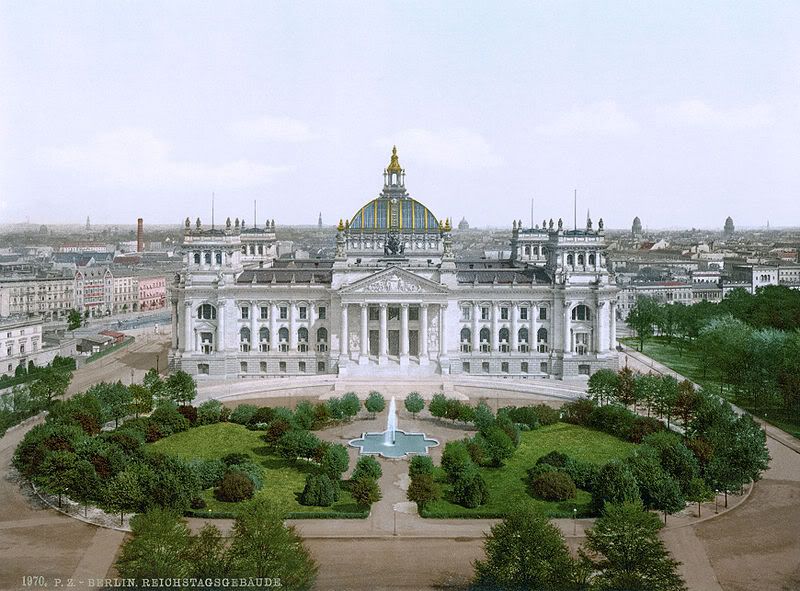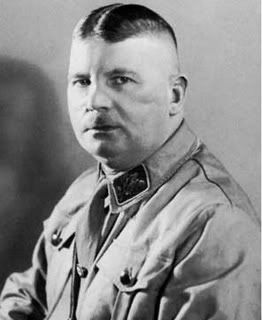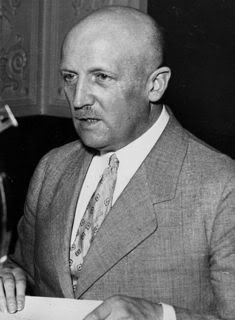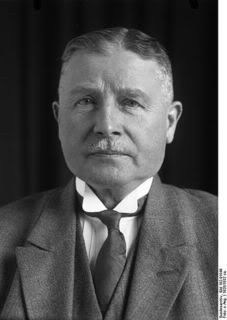Part III: the Black Monday crisis
The Political breakdown
The Imperial German parliamentarian system knows two branches, the Reichtag and the Bundesrat, who share legislative power between themselves. The members of the Reichstag are chosen by democratic election each four years, with each German citizen above 25 being allowed to vote, the women of the Empire gaining the vote in 1927. The Reichstag knows no fixed number of deputees, with each 60.000 votes giving a party one seat in government. As of january 1936 the Reichstag knows 647 members. The Bundesrat is filled with delegates appointed by the governments of the German states knows a fixed number of delegates per state. The representatives are appointed by the state governments. This leads to the conservative Bundesrat often clashing with the surprisingly liberal Reichstag, with both Houses having to agree on a law before it can be implemented. Yet both Reichstag and Bundesrat can be overruled by Imperial decree, with Kaiser Wilhelm II still being the highest authority in the Empire. Yet in practice the Emperor rarely interferes with the day to day governing of the Empire since the end of the Weltkrieg. Still, only His Imperial Majesty can appoint, or dismiss, the chancellor and his government, giving him a powerful position in the German political system.
Current composition of the Reichstag
- Socialdemokratische Partei Deutschlands (SPD): 168
- Deutschkonservative Partei (DKP): 139
- Zentrum : 125
- Fortschrittliche Volkspartei (FVP): 68
- Nationale Deutsche Volkspartei (NDVP): 52
- Nationalliberale Partei (NLP): 45
- Alldeutscher Verband (AV): 31
- Smaller Parties and independents: 19
Current composition of the Bundesrat:
- Kingdom of Prussia 17
- Kingdom of Bavaria 6
- Kingdom of Saxony 4
- Kingdom of Württemberg 4
- Grand Duchy of Baden 3
- Grand Duchy of Hessen 3
- Imperial territory of Elsass-Lothringen 3
- Grand Duchy of Mecklemburg-Schwerin 2
- Grand Duchy of Luxemburg 2
- Duchy of Braunschweig 2
- 17 Duchies, Counties and Free Cities 1 vote each
The parties of the Reichstag
SPD: the SPD has been the largest party in the Reichstag ever since the end of the Weltkrieg and the resumption of parliamanterian democracy. Yet the party is suffering from powerstruggles between the different wings within the party. The most powerfull wing in the party are still the so-called Ebertists, who follow the late Friedrich Eberts line on moderation and cooperation between the SPD and the government. Ebert had been one of the first to support Tirpitz in his effort to remove Ludendorff from power, and was able to get concessions concerning working hours regulations and state insurances in return. The Ebertist line is being followed by Reichstag spokesman Otto Wels. Against this line stands the so-called Spartakist line of Karl Liebknecht, who sees the Ebertist line of cooperation with the reactionaries as an unforgivable betrayal of the working class. The SPD once knew a syndicalist wing too, but Ernst Thällmann and his supporters where expelled by Ebert shortly before his death.
DKP: the conservative party is the main vehicle for the Prussian Junkers to maintain their grip on the Empire, with most of the current cabinet being members of this party. The DKP has been present in parliament since 1876, but it wasn’t until 1930 that the party was able to rise to power. After the death of Admiral Von Tirpitz, his NDVP splintered between the hardliners, led by Hugenberg, and the moderates. In the end an alliance between the NDVP-dissenters, rightwing NLP-delegates, old KVP members and independent conservatived led to the formation DKP as it exists these days. In this new party the clique centered around Franz von Papen, a former Zentrum politician, and former General Staffer Kurt von Schleicher quickly rose to prominence. Yet recently the resistance against the dominance of Papen and Schleicher is growing, while the relation between the two men itself isn’t what it once had been either.
Zentrum: as it name says, the Catholic center party tried to find a middle ground between the liberal parties and the conservatives with mostly moderate stances on most issues. Yet the very fact that the party is mostly made up of Catholics has earned it the distrust of most protestant Germans, including the Kaiser. The fact that the chairman of the party, father Ludwig Kaas, was the longtime secretary of Cardinal Pacelli, a confidant of the Holy Father himself, raises the old fear of Papist influence over the protestant Reich, which was the very reason Bismarck started his
Kulturkampf. The Zentrum leader in the Reichstag, Heinrich Brüning, does his best to ease these fears, hoping for Zentrum to join the Imperial government in the near future.
NLP: the Nationalliberale Partei has never truly recovered from the death of their figurehead Gustav Stresemann, the popular foreign minister under Tirpitz. These days the National liberals find themselves crushed between the more market oriented FVP, the NDVP nationalists and the DKP. Yet recently the NLP has found a new figurehead in the legendary Generalfeldmarschall and former Statthalter Paul Emil von Lettow-Vorbeck. Yet while the very metioning of this great hero send shivers down the spine of his opponents, many think the old Marshall lacks the tact, his temper is legendary, and political clout required to survive the political jungle.
FVP: the Fortschrittliche Volkspartei is a rarity in the Reichtag for being the only party wishing to cut back on government spending and promoting free trade. It is also one of the two parties, the SPD being the other, wishing to introduce more democracy in the German political system, reforming the constitution with that of the former British Empire as a model. The FVP faction is small, but capably led by Walther Rathenau.
DNVP: the DNVP was founded by Admiral von Tirpitz shortly after the end of the Weltkrieg in reaction to Ludendorffs dictatorship. After the Admirals death in 1930 the party began to crumble between the far right nationalists and the more mainstream conservatives that made up its members. These days industrialist and media baron Alfred Hugenberg has near total control of the party and steers in on an increasingly reactionary path.
AV: the Alldeutscher Verband had existed since 1891, but had never been more that an small non-political organisation promoting pan-Germanism and imperialism. It also promoted social-darwinist theories. This changed after the Weltkrieg, when disgruntled, demobilized soldiers flooded the cities of Germany, finding that Germany had changed in their absence. Many of these men formed sldier associations in order to keep in touch with their comrades. It was in one of these assosiations that Oberleutnant Ernst Röhm first rose to prominence, leading a violent demonstration in München, clashing with syndicalist protesters, leading to 14 deaths. Röhm quickly became a figurehead for the populist and nationalist sentiments sweeping Germany. The AV sought out Röhm to lead their movement, not knowing he and his cronies would take over the party completely within a year. Since then the AV has merged with many of the small and radical populist and nationalist parties as the Deutsche Arbeiders Partei. Despite the AVs growing electoral support, with its first members being elected in the Reichstag in 1933, Röhm has chosen not to join the Reichstag faction, currently led by Gregor Strasser. Röhm prefers to lead the AV in their fight for the streets against syndicalists and socialists alike. These days the sight of brown shirted AV-men parading is quite common.
Ernst Röhm, former oberleutnant in the Bavarian Army. These days Röhm leads his AV men in streetbrawls against the syndicalists.
The political aftermath
The crisis came at the moment Von Papens arrogance versus the parliament had led to only the DKP supporting the government unconditionally. Yet Papen needed the support of the Reichstag, both to push through a reform package and to avoid a vote of no confidence. In order to combat the crisis effectively, Von Papen would need to make use of all of his skills, favours and friends he had gathered in all his years in Berlin. The NLP, FVP and Zentrum had supported the Tirpitz and Hutier administrations before, and Hugenberg had never made a secret of his desire to have the NDVP join the government. Unfortunately most of the partyleaders, Lettow-Vorbeck, Brüning and Rathenau, had become personal enemies of the chancellor (at least in his view). Therefore Papen chose to give the task of finding support to the government to Kurt von Schleicher, who was more acceptable to negotiate with for most other parties.
Kurt von Schleicher, General der Infanterie, former General Staffer, a personal friend of Kronprinz Wilhelm and State Secretary (without protfolio) in Von Papens cabinet, Kurt von Schleicher was one of the most well connected men of the Empire and it was rumored he was the only man whose political power Papen feared.
It made perfect sense to send Schleicher to open negotiations with the Reichstag. If Schleicher was successful, Papen could claim credit for his work and if he failed Papen could put the blame on him. As Papen expected, the parties of the Reichstag where in no mood to either give the government a break, or to cooperate with their political opponents. Yet Schleicher, knowing Papens tactics all too well, had one trump up his sleeve: his old mentor Wilhelm Groener. Together with Groener, Schleicher started his consultations with the spokesmen of the other parties
Wilhelm Groener had been the man to help defeat both Makhno’s anarchists and the Red Army (at the Battle of Tsaritsyn) in 1921 at the head of a German expedition army to help the White Forces in the Russian civil war. Later he was promoted to Generalfeldmarschall and had joined the government of Admiral Tirpitz as the State Secretary of the Interior. After the death of Tirpitz, Groener retired from national politics, but became Prime Minister of his native Württemberg.
Yet while the German economy was falling apart, with Groener and Schleicher trying their best to save Von Papens government, the very fundaments of Mitteleuropa where shaken by a motion the government of Lithuania surprisingly accepted. A motion rejecting the use of the German language in state affairs…





